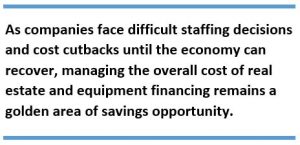In the years leading up to the 2019 Transition Date for ASC 842 and IFRS 16, we authored a couple of articles on FASB’s Gift and Moneyballing CRE where we projected that the significant investment in new systems, data assembly, financial integration and new processes and controls would pay substantial dividends in the overall asset management of many companies. These benefits included:
- Development of a cross-functional system of truth that would enhance proactive planning and decision-making.
- Shine a spotlight on the “Flexibility Premium” that most companies pay when simply renewing leases over periods that can often span decades.
- Integration of contract administration, accounts payable, and financial reporting systems that are part of labor-intensive processes with limited audit and cross-validation.
- Improved data analytics and reporting to provide better information for proactive portfolio management.
- Engagement of Finance and Treasury in understanding the long-term impact of lease vs. own decisions.
- Building new controls over leasing decisions and instituting improved controls over decentralized contracting authority.
While there have been many impacts related to the COVID-19 pandemic, one of the less reported, long-range lost opportunities is the pause placed on longer-term structural change projects. There are a few examples of this phenomenon that reveal the impact.
- Many public companies, in the urgency to meet the financial reporting deadlines, omitted the legal lease terms when building their lease data sets, instead planning that supplemental work for “Phase 2”. Unfortunately, when the pandemic and shutdown occurred, they were left manually scrambling to review lease clauses for Default, Eminent Domain, Force Majeure and others that had not been fully abstracted in Phase 1.

- The planned integration between Lease Administration and Lease Accounting was not fully perfected in 2019, so a number of large companies have split solutions between two or three new systems managed by different groups. Along with creating opportunity for error and reconciliation, this approach will add significant cost in maintaining multiple datasets over the long term.
- Private companies that anticipated a 2020 transition and invested early in building their new systems and process have taken the two-year extension offered by FASB as an opportunity to pause the projects. Unfortunately, this will lead to stale and unreliable data and may require a greater level of effort to reconstitute the original work before 2022, along with the delay in benefiting from improved process and information.
Disbanding the cross-functional teams that were building new systems and processes has brought back the more siloed approach to corporate asset management. As companies face difficult staffing decisions and cost cutbacks while the economy recovers, managing the overall cost of real estate and asset financing remains a golden area of savings opportunity.
In many cases, real estate, fleet and equipment leasing can represent more than 15% of all SG&A costs and is far and away the least managed element of corporate expense. With hundreds of millions, and sometimes billions, of dollars of spend, the promise of significant savings opportunities remains. With the foundation of the systems and data already built, the only impediment may be getting the band back together and moving forward with the next Phase.

